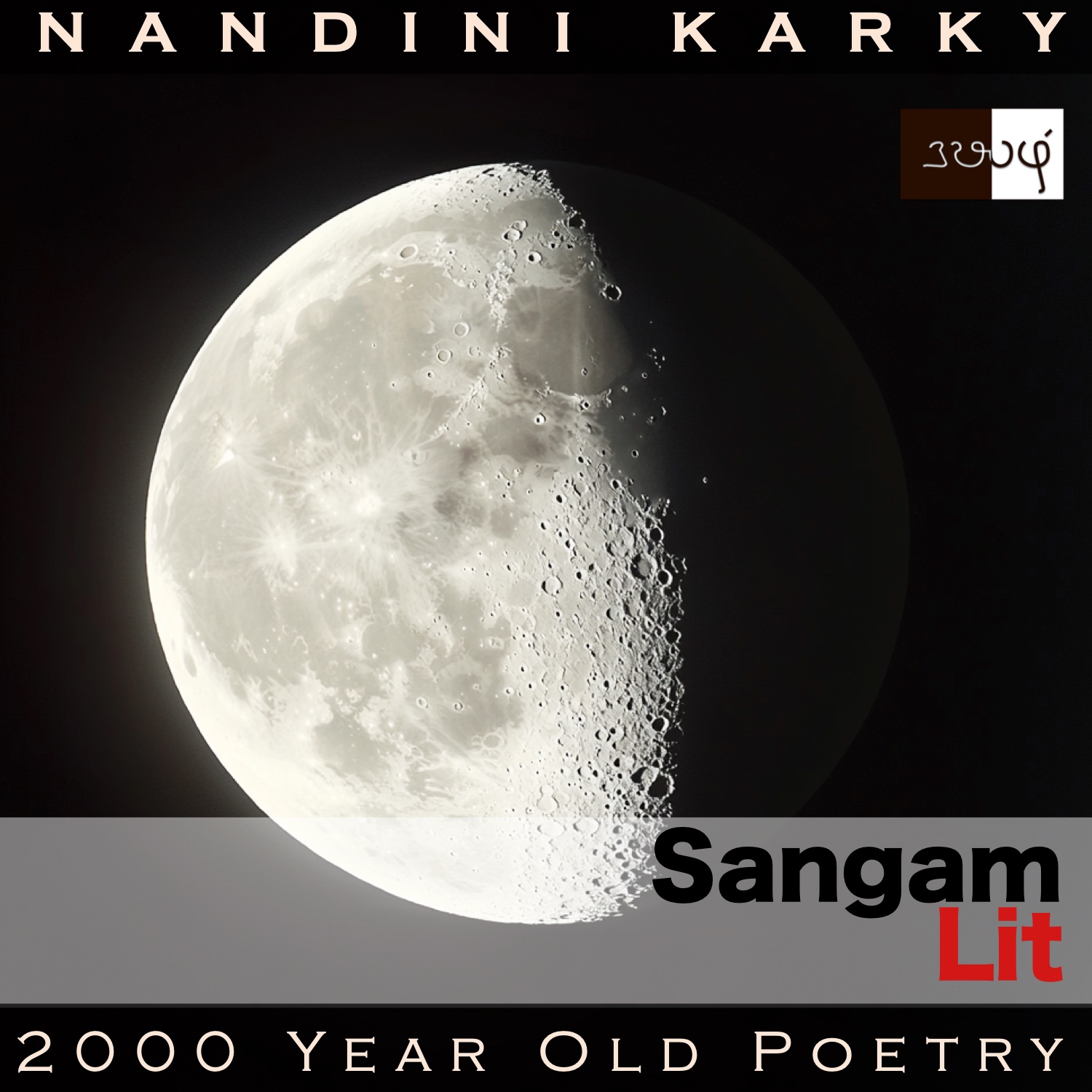Podcast: Play in new window | Download
Subscribe: Apple Podcasts | Spotify | Amazon Music | Android | iHeartRadio | TuneIn | RSS | More
In this episode, we perceive picturesque similes employed to persuade a person, as depicted in Sangam Literary work, Kalithogai 17, penned by the Chera King Paalai Paadiya Perunkadunko. The verse is situated in the ‘Paalai’ or ‘Drylands landscape’ and presents the power of the right words at the right time.

படை பண்ணிப் புனையவும், பா மாண்ட பல அணை
புடை பெயர்ந்து ஒடுங்கவும், புறம் சேர உயிர்ப்பவும்,
‘உடையதை எவன் கொல்?’ என்று ஊறு அளந்தவர்வயின்
நடை செல்லாய், நனி ஏங்கி நடுங்கற்காண் நறுநுதால்!
‘தொல் எழில் தொலைபு இவள் துயர் உழப்ப, துறந்து நீ,
வல் வினை வயக்குதல் வலித்திமன்; வலிப்பளவை,
நீள் கதிர் அவிர் மதி நிறைவு போல் நிலையாது,
நாளினும் நெகிழ்பு ஓடும் நலன் உடன் நிலையுமோ?
ஆற்றல் நோய் அட, இவள் அணி வாட, அகன்று நீ,
தோற்றம் சால் தொகு பொருள் முயறிமன்; முயல்வளவை,
நாற்றம் சால் நளி பொய்கை அடை முதிர் முகையிற்குக்
கூற்று ஊழ் போல் குறைபடூஉம் வாழ்நாளும் நிலையுமோ?
வகை எழில் வனப்பு எஞ்ச, வரை போக வலித்து நீ,
பகை அறு பய வினை முயறிமன்; முயல்வளவை,
தகை வண்டு புதிது உண்ணத் தாது அவிழ் தண் போதின்
முகை வாய்த்த தடம் போலும் இளமையும் நிலையுமோ?’
என ஆங்கு,
பொருந்தி யான் தான் வேட்ட பொருள்வயின் நினைந்த சொல்,
திருந்திய யாக்கையுள் மருத்துவன் ஊட்டிய
மருந்து போல், மருந்து ஆகி, மனன் உவப்ப
பெரும் பெயர் மீளி பெயர்ந்தனன் செலவே.
The confidante’s ‘no’ said with much imagery! The words can be translated as follows:
“Saying, ‘Refining and readying weapons, moving away and lying afar on the fine bed with many pillows, sighing when embraced from behind, he acts differently’, and wondering, ‘What could be in his mind?’, like those who mull over problems to come, unable to be normal, don’t you tremble and quiver, O maiden with a fragrant forehead!
‘Making her lose her old beauty, leaving her to wallow in sorrow, you intend to leave her and go fulfil your duties of strength; Strong indeed, you are! If you be so, akin to how the long-rayed, blooming, full moon, does not remain so, day by day, the beauty of hers will desert her. Will it remain till you return?’
‘Making the disease of affliction invade her, as her beauty fades, you intend to move away from her and try to gather that outwardly esteemed wealth; If you do so, akin to how a mature bud amidst the leaves in a fragrant, wide pond meets death, time will diminish her days. Will these remain till you return?’
‘Making her many different qualities of beauty vanish, you intend to part away to the mountains and try to fulfil your duties of quelling your enemies; If you do so, akin to the waters of a pond filled with buds, to eat whose cool pollen, many bees arrive, over time, her beauty too will recede. Will it remain till you return?’
Saying all these, the thoughtful and meaningful words that I rendered with relevance, akin to the perfect medicine given to the suffering body by the healer, it became a cure for him. And so, making your heart delight, the great and famous lord set aside his journey!”
Let’s explore the details. The verse is situated in the context of the man’s parting from the lady after marriage. Within this verse, the thoughts of the lady, words of the confidante to the man are presented in the cover voice of the confidante. At first, the confidante relays the words the lady just told her, about how the man seemed to be preparing his weapons, and then, lying away from her on the bed, and also, sighing whenever the lady embraced him. Noticing these subtle gestures, the lady has become worried and asks the confidante what he could be thinking. The confidante asks her not to worry at all, and then goes on to convey her conversation with the man.
The confidante, in the three-step approach, talks to the man mentioning about how he intends to leave the lady and part away to fight a battle, win over the wealth and subdue his enemies. She puts forth three pertinent questions then. One, won’t the lady’s beauty fade like how the full moon wanes? Two, won’t time diminish the days of the lady like how a bloomed bud finds its end in the hands of death? Three, won’t the lady’s beauty recede like the waters of a pond, now so lush, as the time parted increases? In each case, she asks the man whether the lady’s life and beauty will remain till he comes back. She concludes to the lady that because she said these well-thought-out words of substance, like how the perfect medicine given by a doctor cures the patiently instantly, the man too was cured of his intention to leave on his mission, and making the lady happy, he had decided to give up his journey.
We can’t help noticing how the confidante pats herself on her back for her perfect words to persuade the man! The highlight of this verse is the sequence of striking similes that denote the lack of permanence, used to indicate the importance of being present and content. Also, through the last simile, fascinating to know about the medicine people of Sangam times and their perfect cures for conditions then! Unfortunate that owing to the passing of time, we will never know what these perfect cures are. In the race against time, science has lost and poetry has won, presenting another argument for the power and permanence of words and emotions!




Share your thoughts...